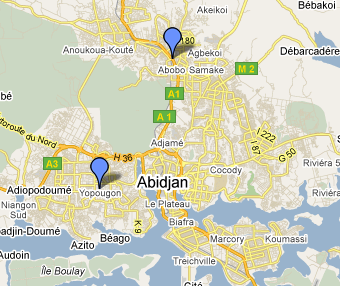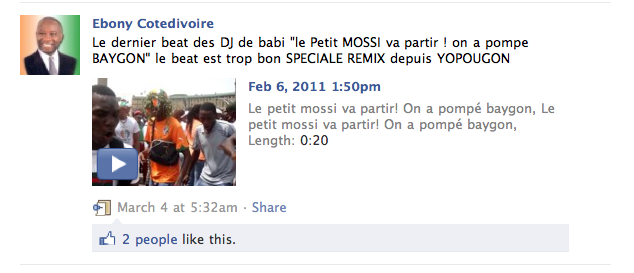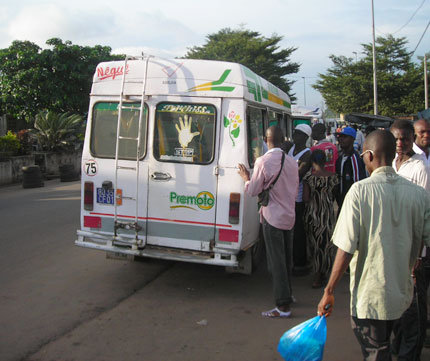On the morning of Sunday March 13, 2011, a young merchant from the north of Côte d'Ivoire was visiting his relatives in the economic capital, Abidjan, on the south coast. The amulets he wore around his neck were characteristic clothing of the Dioulas, an ethnic group from the north of the country.
Sadly, these talismans lost him his life. According to a gang of youths, all supporters of Ivorian President Laurent Gbagbo, they were fatal evidence that he belonged to an opposition "army of rebels". They tortured and stoned him to death. The incident took place in Yopougon, a district of Abidjan, and was filmed. The video was posted by YouTube user AfricaWeWish on March 15.
On the video you can see a crowd gathered around the young man on the ground. He has been covered in tree branches. After hearing that the man is from a Northern city of Côte d'Ivoire, people start throwing bricks at his face. An Ivorian blogger has confirmed that the man killed in the video was from the north.
At 00:44 minutes the assailant asks, "You were just passing by? Where did you come from?". The man on the ground replies at 00:55 minutes, "I'm a trader in Séguéla (in the north of the country)" and at 01:20 minutes they start throwing stones at him. This corresponds with the version of the story shared on the Twitter hashtag #civ2010. This is the link to the video, but please be warned these are extremely graphic images.
A city divided
Abobo and Yopougon are two districts in Abidjan, the economic capital city of Côte d'Ivoire. One of West Africa's largest urban centres, it is a city divided.
[caption id="attachment_208537" align="alignright" width="275" caption="Map of Abidjan showing Abobo to the north and Yopougon to the south"]
 [/caption]Abobo has around 1.5 million residents and is mainly a Muslim district. As a result, it is a natural electoral base for supporters of Alassane Ouattara, the internationally recognised president after the December 2010 election who is from the Muslim north.
[/caption]Abobo has around 1.5 million residents and is mainly a Muslim district. As a result, it is a natural electoral base for supporters of Alassane Ouattara, the internationally recognised president after the December 2010 election who is from the Muslim north.Yopougon meanwhile, with around 1.1 million residents, is the city's stronghold of Laurent Gbagbo supporters. Gbagbo, president since 2000, is widely believed to have been defeated by Ouattara in the public vote, but so far has refused to stand down despite international pressure. Since the election, violent clashes have been reported between supporters from both sides.
In both districts, different religious and ethnic groups had mixed peacefully until the beginning of the recent Ivorian political crisis. For the last ten days however, both Abobo and Yopougon have witnessed incidents of ethnically motivated violence, further crystallising the political dispute and the threat of civil war.
Since February 25, 2011, around 20-30,000 people have fled Abobo; on February 23, dozens of soldiers [fr] from Gbagbo's Security and Defense Forces were killed in the district by pro-Ouattara 'Invisible Commando' forces. YouTube user 2baz1 posted this video of people fleeing Abobo on February 27, 2011:
[embed]http://www.youtube.com/watch?v=n0hof0mjDZ0[/embed]
Théophile Kouamouo explains the background to the violence in an article [fr] on website Jeune Afrique:
On y trouve un cocktail politiquement explosif : une forte concentration de populations musulmanes originaires du nord du pays, vivier naturel de la cause « ouattariste », à laquelle s’ajoute une terrible désespérance sociale, conséquence d’une insécurité galopante, mais aussi de taux records de chômage et de séroprévalence.
There [Abobo] one finds an explosive political cocktail: a large Muslim population from the north of the country, a natural breeding ground for pro-Ouattara supporters, plus terrible social despair, the result of widespread insecurity but also record unemployment and disease prevalence.
In the meantime, in Yopougon where the Muslim community is the minority, a mosque was vandalised by young Gbagbo supporters. On March 14, 2011, two men were burnt [fr] on suspicion of being members of Ouattara's 'Invisible Commandos'.Escalation of hatred
How did the country get to this point ?
The question of religious identity resurfaced on December 3, 2010, when the Ivorian Constitutional Council, in opposition to Electoral Commission's results, declared Laurent Gbagbo president by invalidating the votes of some 600,000 people in the northern, mostly Muslim, regions of the country.
Laurent Gbagbo and his wife, Simone, are both declared born-again Christians who are not shy about sharing their faith in a political context. On Simone Gbagbo's website [fr], religion is said to have an important place in the former first lady's life and political commitment:
CONVAINCUE QUE LE SANG DE JESUS QUI A COULE A LA CROIX EST PUISSANT ET PEUT SAUVER QUICONQUE CROIT, LA 1ERE DAME PENSE QUE PAR CE SANG NOUS SOMMES LAVES ET PURIFIES ET RENDUS CAPABLES D'OPERER DANS LA MEME DIMENSION QUE NOTRE SEIGNEUR AFIN DE TRANSFORMER NOS COMMUNAUTES ET POURQUOI PAS NOTRE NATION (JEAN 14: 12).
I am convinced that Jesus' blood, which was shed on the cross, is powerful and can save anyone who believes, the First Lady thinks that through this blood, we are washed and purified and thus able to operate in the same dimension as our Lord in order to transform our communities and even our nation (John 14:12).
One Ivorian native netizen posted a message on American politician Sarah Palin's Facebook page in December 2010, in which he urged American Christians not to let US President Obama standby without supporting the Gbagbos:Will Americans idly sit on the side and watch their President humiliate Laurent Gbagbo and Simone Ehivet Gbagbo, a Born-again Evangelical Christian couple and throw them out of office or watch some Muslim rebels invade their palace and kill them with the conspiracy of the international community?Sacha Project, a blogger [fr] who resides mainly in Abidjan, wrote a post on March 11, 2011, refering to French daily Le Monde's editorial of the same day entitled, "The future of Africa is playing out in Côte d'Ivoire" [fr], in which the author compares Côte d'Ivoire to the Spain of 1936 under Franco. Sacha Project believes that the comparison has a lot of merit:
Comme dans l’Espagne de 1936, un État se trouve menacé par une minorité armée refusant un pouvoir légitimement élu, (...).Gbagbo n’est pas Franco, Gbagbo n’est pas fasciste. Pourtant les idées du FPI le sont. Franco ne se disait pas fasciste mais se voulait « nationaliste ». Gbagbo se veut « patriote ». Le nationalisme xénophobe à outrance, l’ivoirité et ses chantres, les techniques de manipulations médiatiques, le discours religieux de Simone Gbagbo tenant le pouvoir de son mari pour un pouvoir quasi divin, sont les éléments en quelque sorte, d’un fascisme à l’ivoirienne.
Like in the Spain of 1936, a state is threatened by an armed minority which refuses a lawfully elected president (...). Gbagbo is not Franco, Gbagbo is not a fascist. Yet the ideas of the Ivorian Patriotic Front (FPI) are. Franco didn't consider himself fascist, but "nationalist". Gbagbo considers himself a "patriot". Yet the excessive xenophobic nationalism, Ivorian identity and its eulogists, media manipulation, and Simone Gbagbo's religious speech which considers her husband's power as quasi-divine, these are elements of an Ivorian style fascism.
Proof of the recent escalation of ethnic and religious antagonism in Ivorian society is more than visible on the web. Global Voices author Anna Gueye, demonstrated in a recent article examples of Facebook users who are spreading hate speech against Ouattara's supporters.In fact, Facebook is filled with commentary and hate speech on the Ivorian crisis. Ebony Côte d'Ivoire shared on March 4, 2011, a video of a hatred-inciting song comparing opponents of the Gbagbo government to "Mossi" (mosquitoes) who should be killed with "Baygon" (insecticide):

The song literally says:
Little Mossi will die, we will pump BaygonYoutube user AfricaWeWish posted a video of people singing and dancing to this song, the user showing their obvious distaste through the title given to the video: "Slogan for a future Genocide? We will pump Baygon".
"Mossi" also has another meaning, as explained by @Belligiani on Twitter:
Mossi c'est une ethnie du burkina faso, mais les Ivoiriens ont tendance a appeler Tout ce qui vient du burkina "mossi"!
The Mossi are an ethnic group from Burkina Faso, but Ivorians tend to call everyone who is from Burkina "Mossi"!
He continues:Mais mossi est utilise comme une injure pr les diminués!
But Mossi is an insult used for "diminished" people!
According to a local source interviewed via web chat, this song is popularly sung in popular pro-Gbagbo areas of Abidjan, like Yopougon. On Twitter, a user called @MossiDramane who seems to relish the strife and provocation, wrote on March 7 about Ouattara supporters mainly from the Muslim north:Vos tueries selon sont autorisé par le coran.#civ2010
Your deaths are permitted by the Quran. #civ2010
He also writes in Dioula, a regional Ivorian northern language:Les djoulas gawa lá on a ramené l'o et le courant.dansez un peu kè!!pidi pandan!!goumé+sipa tchié AGBANAN dèh!! #civ2010According to a source living in Abidjan, who translated the quote, those words are clearly inciting hatred towards ethnic Dioulas:
Stupid Dioulas [ethnic group, from the north], we gave you water and electricity in the north. Come on dance now! Pidi Pandan [imitation of the sound of the malinké northern ethnic drum]! Goumé and sipa [these are traditional malinké dances], wow, it will be hot!!
Violence in the streetsIn Yopougon, where a minority Muslim population is settled in the Wassakra neighbourhood, a witch hunt was organised against the Muslim population. On March 6, 2011, the Facebook group called "Ivorians on Facebook for ADO" (Alassane Dramane Ouattara) posted a video, in which young men can be seen being burnt, with tyres being placed on them.
The video (Warning: Graphic content) was also put on YouTube by user SAGEZELE on March 6 also, and has been viewed by more than 17,000 people.
The France 24 Observers website posted a comprehensive article describing what happened on that day, based on the testimony of an inhabitant:
The whole neighbourhood was talking about it, so I went to see. The two charred bodies were still in the middle of the tyres opposite the Siporex pharmacy, close to the Dabon Yopougon train station. All of the shops were closed. Whilst I was there people explained to me what happened, but it is difficult to verify their version of events because by the time I got there, there were only militia and pro-Gbagbo activists around. According to them, at around 5 or 6am, two men were stopped by the militia, who asked to check their ID. The men did not have their papers with them. They were taken to be pro-Ouattara rebels and the situation got out of hand.An Ivorian politician, Seth Koko, who used to work with Laurent Gbagbo, posted on his self-titled blog on March 7, another description [fr] of the scene. An Anti Riot Brigade (BAE) car can be seen in the beginning of the video, which led Koko to conclude that the BAE, loyal to Gbagbo, was involved with the incident. He explains that at several times during the video, one can hear people shouting "BAE":
A 1mn 20 secondes, nous voyons un homme en tenue militaire, arme à la main, qui attise le feu sous les encouragements d’un assistant qui crie : « BAE !! »
At 01:20 minutes, we see a man in military outfit, a weapon in his hand, who fans the fire, encouraged by an assistant who shouts: "BAE!!"
@sroukoudazoa explains on Twitter:le supplice du pneu en feu les miliciens bébégbagbos l'appellent article 125 : pétrole 100 1 boîte d'allumette 25
the burning tyre punishment, Babygbagbos calls the 125 [Francs CFA] item: gas 100 [francs] and a matchbox 25 [francs]
Ebony Côte d'Ivoire, commenting in one of her Facebook posts, confirms that pro-Gbagbo supporters have used tyres to burn those they call "rebels" [Ouattara supporters]:
(...) Rebel bastards! Since 2002 it's been them cutting people's throats, we burn them with tyres. (...)
Humans are not the only ones to have been burnt in Yopougon. In the following video posted on the video sharing site Afrobox.net, by user Abidjanais, a minivan is destroyed by fire:[caption id="attachment_206560" align="alignright" width="258" caption="Gbaka van in Abidjan, Côte d'Ivoire. Image from lgbagbo.blogspot.com"]
 [/caption]
[/caption]These minivans are called 'Gbakas', and are perceived to be mainly owned by the Dioula ethnic group from the north. The burnings are explained in this article [fr] published on February 27, on the website Connection Ivoirienne after the first occurrence:
Des ‘jeunes patriotes’ qui chaque matin, depuis le déclenchement de la crise postélectorale, font des footings à pas rythmés et encadrés par des hommes en tenue militaire, armes au poing, s’attaquent immédiatement à plusieurs minibus communément appelés ‘gbakas’ et susceptibles d’appartenir à des ‘Dioulas’, communauté ethnique dont est issu Alassane Ouattara.
'Young patriots' who, every morning since the beginning of the post-electoral crisis, jog surrounded by men in military outfits, weapons in hand, suddenly attacked several minivans, generally called 'gbakas', which are likely to belong to 'Dioulas', an ethnic group from which Alassane Ouattara originates.
D, an Ivorian who lives in Abidjan and who wishes to remain anonymous, when interviewed via webchat said:On n'est pas loin de la derive genocidaire
We are on the brink of a genocidal drift
Aucun commentaire:
Enregistrer un commentaire